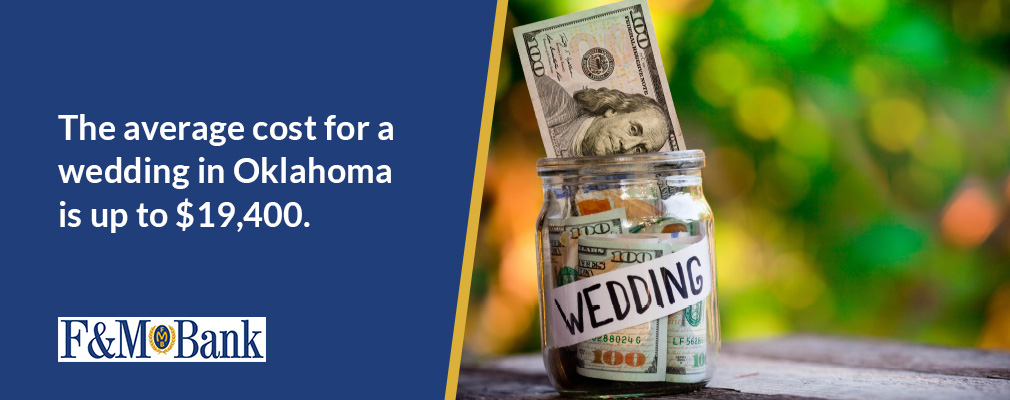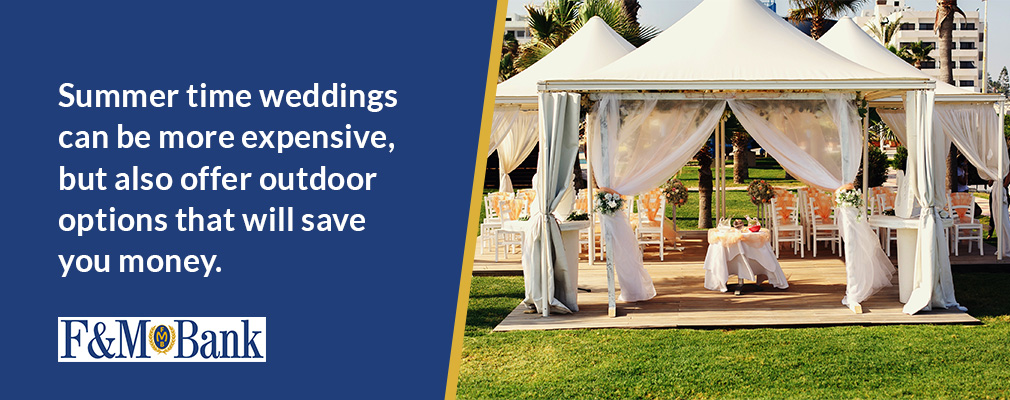Planning a Wedding in OKC: Budget-Friendly Wedding Tips

Planning a Wedding in OKC: Budget-Friendly Wedding Tips
No matter how big or small you envision your upcoming wedding, all those costs—both expected and unexpected—can really add up.
While many hope to offset their out-of-pocket expenses with cash gifts, accumulating any debt through credit cards and personal loans isn’t the best way to start your married life together, especially if there is no guarantee that it can be quickly paid off.
At F&M Bank, we strive to help our customers set out on their life path with firm financial footing. Planning an affordable wedding can play a big role in that process.
In this post, we’ll explore how to set a realistic budget, wedding ideas to keep costs down, and ways to save for your big day, from simple and versatile savings accounts to short-term savings accounts like CDs.
Keep reading to learn more tips for planning your Oklahoma City wedding on a budget!
Steps for Setting a Wedding Budget
Creating a budget for your wedding involves a lot of moving parts. You’ll need to consider the funds you have available, including savings between now and your wedding day, comparing your resources to your preferences and their associated costs.
Familiarize Yourself with Costs
An important first step is understanding how much average weddings cost, so you can effectively budget and plan your wedding. According to the Wedding Report, the average cost of a wedding for 50-100 guests in Oklahoma City is between $15,866 and $19,392.
Individual expenses include:
- Attire and Accessories: $1,886 - $2,305
- Hair and Makeup: $132 - $162
- Entertainment: $609 - $745
- Flowers and Decorations: $1,370 - $1,674
- Invitations: $114 - $140
- Jewelry: $1,057 - $1,291
- Photography and Video: $2,586 - $3,160
- Venue, Catering, and Rentals: $8,113 - $9,915
It’s important to keep in mind that it’s absolutely not necessary to set your budget based on the numbers above. Like you and your spouse-to-be, your wedding will be unique. How much you spend will be up to you.
Note: The listed figures don’t include the honeymoon. We’ll talk more about this additional expense later!

Determine a Realistic Budget
When you are creating a budget for your wedding, you’ll incorporate both funds you already have on hand, as well as any funds you are able to save between now and your wedding day.
This second number may be harder to calculate. To do so, you’ll need to think about how much money you can set aside each month (or each paycheck), as well as how long you have until your wedding.
As you develop your savings goal, it’s crucial to be honest and conservative. Setting a goal that is unattainable can lead you to planning a wedding budget that is also too high, resulting in overspending, and possibly accumulating debt—not the way most couples want to start their new lives together!
Set Up a Designated Account for Saving
Once you have a goal for savings, you’ll need to think about where you will save your money.
Creating a designated joint savings account for your wedding budget can help you keep track of your goal, ensure that this money isn’t accidentally spent, and can later be used as a place to deposit any gift money to start growing your nest egg together.
Savings accounts, including personal savings accounts, money market accounts, and certificates of deposit, also have the benefit of earning interest, giving your wedding savings a welcome boost!
Once you choose an account to be a vehicle for your savings, consider setting up automatic monthly or weekly transfers from your checking account to simplify the savings process.
Make a Checklist that Considers Your Budget
Once you have a personalized budget and idea of average local costs, it’s time to make a checklist for each important item. In addition to writing out all the many tasks, bookings, and purchases required for your wedding, your checklist should include:
- Spending Caps: How much can you spend on the item or service.
- Deadlines: A hard date by which you will need to book or purchase the item, to help you plan a schedule of your spending.
- Alternatives: For each item on your list, aim for at least three choices at different price points.
There are many free checklists available for your use—but most don’t prioritize budgeting. And some are so detailed, they may even encourage you to add expenses you may not otherwise have considered.
Reference these checklists when you make yours, but keep in mind that your wedding is your own. For a free budget-oriented checklist, check out The Knot’s wedding planning spreadsheet.

Set and Create Your Guest List
Creating your guest list might be one of the harder parts of planning your wedding. The more guests you invite, the higher your costs will be. But you may also want to consider the feelings of family and friends, and be tempted to not leave anyone out, no matter how big your list gets.
However, if you are working with a strict budget or would prefer a smaller affair, know that it’s okay to limit your guest list. Simply communicate to extended family and friends that you are aiming for a more intimate event. Let’s look at a few other ways to keep your list in check.
Create a Tiered Guest List
It may also be helpful to create a tiered guest list including must-invite guests and guests you would like to invite—if there are funds available. As you finalize your budget and select vendors—and before you send out invitations—you can adjust your list as needed. The important thing is to find balance between your guest list and your budget.
Be Considerate of Guests, Too
Finally, keep in mind that not everyone on your list will be able to make it to your wedding, or afford elaborate wedding plans.
If you’re planning your wedding here in the OKC area, then it may be easier for local guests to attend. However, if you are a transplant to our region, have lots of family and friends out of state, or if you’re planning on a destination wedding, then having a shorter guest list may make more sense. Not only will it help you keep your own costs down, but it will also mean that you aren’t making potential guests feel obligated to stretch themselves thin to attend your wedding, or to spend outside their means on travel and other costs.
Choose Final Services and Consider Areas to Save
Armed with several options for all your major expenses—and a limited guest list—you’re ready to finalize your choices. Keeping your maximum budget in mind, this may be a time to reconsider some of your planned expenses and look for places to save.
Keep Costs Modest Where You Can
If your wedding costs are beginning to balloon, you’ll need to brainstorm ways to keep costs down, while maintaining your vision. Some small decisions are more affordable than others and can provide opportunities to trim your costs. These could include:
- Flowers: Consider limiting flowers, dropping or minimizing table arrangements, or choosing more cost-effective, in-season flowers.
- Music: Choose a DJ instead of a wedding band.
- Clothing and Jewely: Rent jewelry and tuxedos or use family heirlooms instead of buying some items.
- Photography: Create a shared album for attendees to upload photos and videos, reducing some paid photography services.
- Rehearsal Dinner: Make the rehearsal dinner a more informal affair, like a barbecue or potluck. Or skip it all together.
Avoiding a High “Plate Cost”
Everyone loves unlimited drinks and a fancy, three-course meal, but these are no longer expected at modern weddings. From buffets to barbecues, many brides and grooms are forgoing upscale catered affairs to bring their wedding vibe—and their costs—back down to earth.
However, even fully-catered weddings can offer many affordable options to keep your cost per plate—cost to provide food and drinks to each guest—from getting out of hand.
For instance, you can choose a signature cocktail paired with canned or bottled beverages that you provide, instead of having an open bar. You can also simplify dining choices, leaning toward more affordable meal choices. Additionally, you can plan your wedding for a time of day when a big meal won’t be expected, sticking to hors d’oeuvres and light refreshments.
Consider Your Date
The time of year or day of the week can make a big difference in both the availability of (more affordable) venues and the price of venue rentals and other services. For instance, summer is the most popular season for weddings, but if your heart is set on a summer wedding, be prepared to book your venue well in advance, and possibly pay more—especially for weekend dates.
If you’re planning on having your wedding outdoors in Oklahoma in the spring or summer, you’ll need to have options for guests to escape high temperatures and bad weather. May is peak tornado season in Oklahoma City, while June is one of the wettest months, with temperatures also reaching the upper 80s. July and August have less rain, expect highs in the 90s.
Venues that offer both indoor and outdoor options may charge more for access to larger facilities, and renting tents for shade and shelter from weather can also result in an added cost.
Choosing a less-popular time, including weekdays and off-season dates, may save you significantly.

Start a Honeymoon Fund and Skip the Registry
As we mentioned earlier, your honeymoon is an additional wedding expense to consider, and depending on your choice of destination, can be a huge one.
If you already have many household items, instead of a traditional registry you may want to consider having a honeymoon fund. Services like Traveler's Joy allow you to ask for monetary gifts toward your dream honeymoon, allowing you to potentially cut this out-of-pocket expense.
Want to keep it simple? Skipping a registry altogether can also encourage guests to give cash gifts, which can be used to replenish your savings once all is said and done.
You may also consider asking for support in achieving a major goal, like saving for a down payment on a home loan to buy your first home!
Take the Financial Stress out of Planning Your Wedding with F&M Bank
Weddings are a joyous occasion—but they can also be a huge undertaking. And financial stress, on top of all the work that goes into a wedding, can undermine your enjoyment of your big day. Taking steps to set a budget and stick to it, saving for the event instead of going into debt to pay for it, can eliminate many of the financial woes associated with weddings.
At F&M Bank of Oklahoma, we can help you save for your special day. Our dedicated team can work with you to help you understand your budget, set a savings goal, and choose the right savings account for your unique financial picture.
From high-yield CD Savings Accounts with customizable term lengths to align with your wedding timeline, to interest-bearing Money Market Accounts with check-writing and debit capabilities, we have your wedding savings needs covered.
Visit us at your local branch in Central Oklahoma, or apply online for a savings account, and get started preparing for your wedding today!
